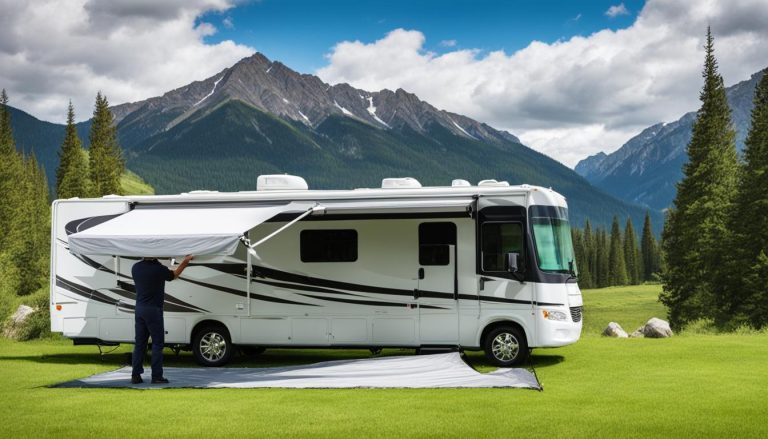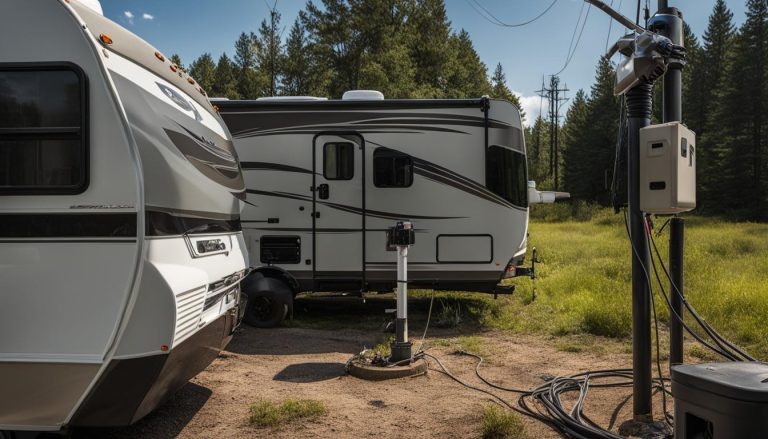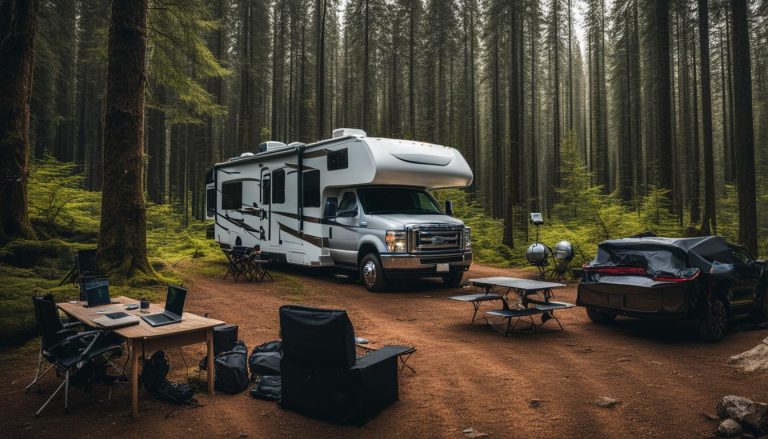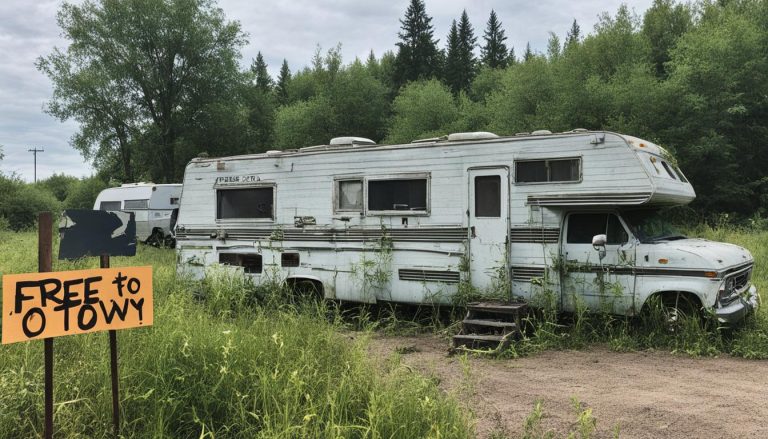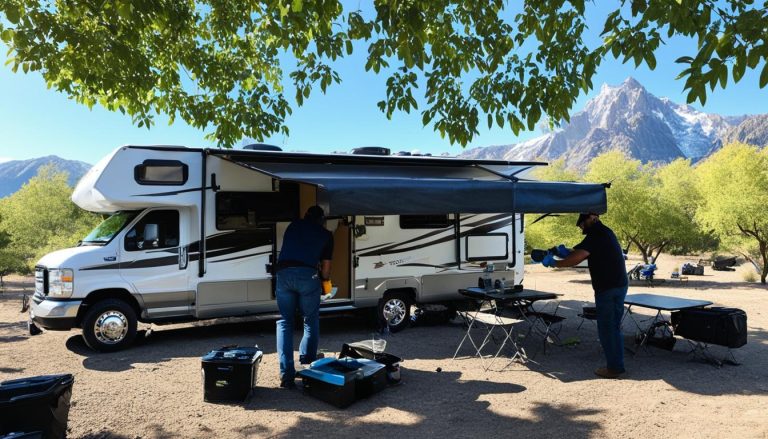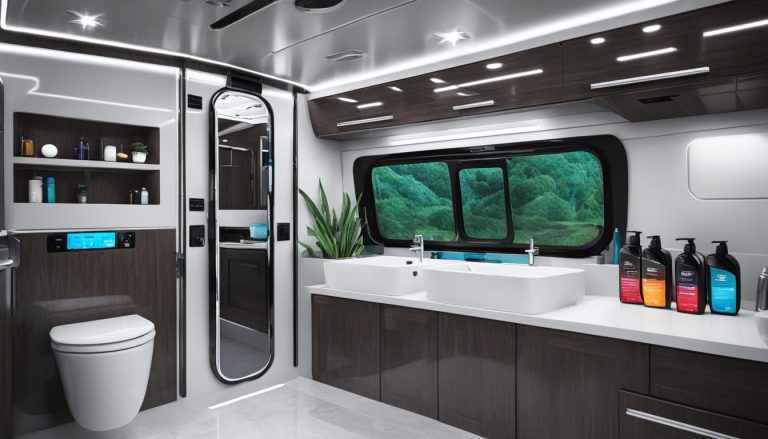RV Converter Troubleshooting & Quick Fixes
gorvlifestyle.com and its partners may earn a commission if you purchase a product through one of our links
Welcome to our guide on RV converter troubleshooting and quick fixes. In this section, we will explore common problems with RV converters and provide you with step-by-step instructions on how to fix them. Whether you’re experiencing dimming lights, loss of power to 12-volt items, or low battery charge, we have the solutions you need to get your RV converter back on track.
Key Takeaways:
- RV power converters are essential for converting 110 volt AC power to 12 volt DC power in an RV.
- Signs of a faulty power converter include dimming lights, loss of power to 12-volt items, and low battery charge.
- Troubleshooting the RV power converter involves checking fuses, breakers, batteries, and other internal components.
- Preventing converter issues requires regular maintenance, proper ventilation, and monitoring electrical load.
- Some DIY fixes for RV converter problems include replacing fuses, checking wiring connections, and cleaning the converter.
Signs of a Faulty Power Converter
Is your RV power converter acting up? Knowing the signs of a faulty converter can help you diagnose the problem and take appropriate action. Here are some common indications that your RV power converter may not be working properly:
- Dimming or flickering lights
- Loss of use of 12 volt powered items such as electrical outlets, lights, or the refrigerator
- Low battery charge
If you notice that your lights are dimming or flickering, it could be a sign that your power converter is struggling to deliver a steady power supply. Additionally, if your 12 volt powered items are not functioning properly, the converter might be the culprit. For example, if your appliances that run on 110 volt AC power are working fine, but your lights are not, it is likely a converter issue.
Before assuming that your converter needs to be replaced, it is important to rule out other potential causes. Blown fuses or bad batteries can also result in similar symptoms. Therefore, it is crucial to check these components first to ensure that they are not the root cause of the problem.
By carefully observing these signs and conducting basic troubleshooting, you can determine whether your RV power converter is at fault and take the necessary steps to address the issue.
Common RV Converter Problems
Here is a breakdown of the common issues that can arise with RV power converters:
| Problem | Symptoms |
|---|---|
| Failed converter | Dimming or flickering lights, loss of 12 volt powered items, low battery charge |
| Blown fuse | Loss of power to specific circuits or appliances |
| Bad battery | Loss of power to 12 volt devices, low battery charge |
| Overheating | Burning smell, hot to the touch |
| Wiring issues | Inconsistent power, intermittent functionality |
Understanding these common problems can help you identify the specific issues you may encounter with your RV power converter. Once you have identified the problem, you can take appropriate action to troubleshoot or fix it.
Troubleshooting the RV Power Converter
When it comes to troubleshooting an RV power converter, there are several steps you can take to identify and resolve issues. Starting with the basics is key. Here are some important troubleshooting tips to help you fix common RV converter problems:
1. Check the Fuses and Breakers
Blown fuses and tripped breakers can often be the cause of converter issues. Take the time to inspect all the fuses and breakers in your RV’s electrical system. Replace any blown fuses or reset any tripped breakers you find. This simple step may resolve the problem.
2. Check the Batteries
In some cases, a faulty battery can mimic converter issues. Ensure your RV’s batteries are in good condition and properly connected. Check for loose or corroded terminals, and test the batteries’ voltage levels. If the batteries are not providing enough power, it may appear as if there is a problem with the converter.
3. Inspect Internal Components
The internal components of the power converter can also be the source of trouble. Check the converter fan to ensure it is functioning properly and not obstructed by dust or debris. Examine the temperature sensor and load sensor for any signs of damage or malfunction. If necessary, clean or replace these components to restore optimal converter performance.
4. Consider Replacing the Power Converter
If the troubleshooting steps above do not resolve the issue, it might be necessary to replace the power converter. Over time, converters can wear out or become damaged beyond repair. Consult the manufacturer’s instructions or a qualified RV technician for guidance on finding and installing a suitable replacement.
By following these troubleshooting techniques, you can effectively address many common RV power converter problems. However, if you are unsure about performing the repairs yourself, or if the issue persists, it is always best to seek the assistance of a qualified professional.

| Issue | Troubleshooting Steps |
|---|---|
| Blown Fuses | Inspect all fuses and replace any blown ones. |
| Tripped Breakers | Reset any tripped breakers in the electrical system. |
| Faulty Batteries | Check battery connections, terminals, and voltage levels. |
| Internal Component Issues | Examine the converter fan, temperature sensor, and load sensor. |
| Converter Replacement | Consult manufacturer’s instructions or seek professional help. |
Preventing RV Converter Issues
Taking preventative measures can help you avoid RV converter issues in the first place. By prioritizing regular maintenance and implementing protective measures, you can ensure the optimal functionality and longevity of your RV power converter.
Maintenance
Regular maintenance is key to keeping your RV converter in top shape. Follow these maintenance tips to prevent issues:
- Clean the Converter: Regularly clean the converter to remove dust and debris that can hinder its performance. Use a soft brush or compressed air to gently clean the exterior and interior components.
- Check for Loose Wiring Connections: Inspect the wiring connections to ensure they are secure and free from corrosion. Loose or damaged wiring can lead to power inconsistencies and converter malfunctions.
Protective Measures
Implementing protective measures can safeguard your RV converter from potential hazards and extend its lifespan. Consider the following:
- Proper Ventilation: Ensure that your converter is adequately ventilated to prevent overheating. Keep the area around the converter clear of obstructions and allow for sufficient airflow.
- Away from Water Sources: Keep your converter away from water sources to avoid moisture damage. Place it in a dry and secure location within your RV.
- Surge Protectors: Use surge protectors to safeguard your RV converter from power surges and fluctuations. These devices help regulate the electrical flow and protect sensitive components from damage.
- Monitor Electrical Load: Be mindful of the electrical load on your converter. Avoid overloading it by keeping track of the appliances and devices connected to your RV’s power system.
To get a visual understanding of preventative measures to protect your RV converter, refer to the following table:
| Preventative Measures | Description |
|---|---|
| Regular Maintenance | Perform routine cleaning of the converter and check for loose wiring connections. |
| Proper Ventilation | Ensure the converter is well-ventilated to avoid overheating. |
| Away from Water Sources | Keep the converter in a dry location away from water sources. |
| Surge Protectors | Use surge protectors to safeguard against power surges. |
| Monitor Electrical Load | Be mindful of the electrical load on the converter to prevent overload. |
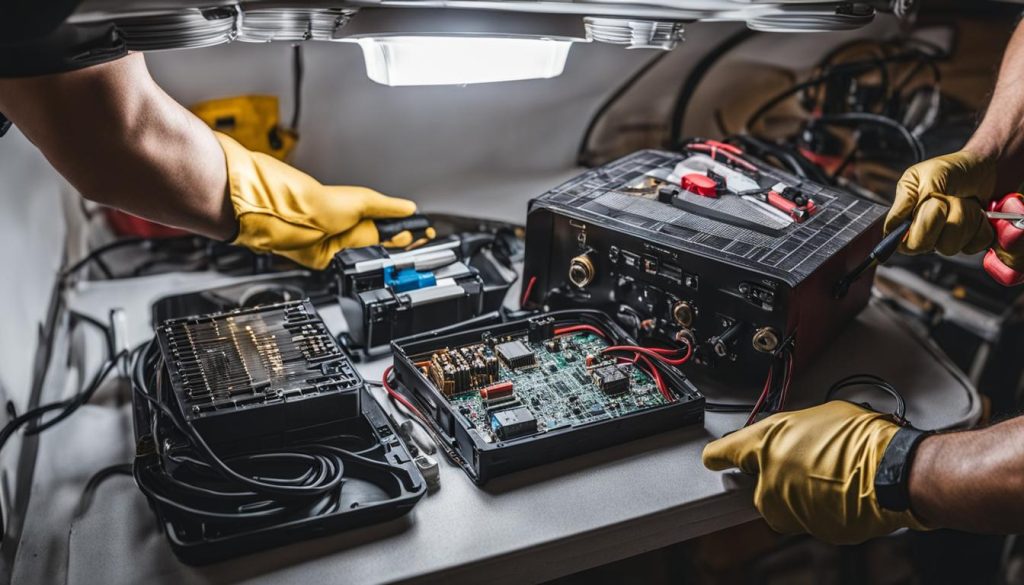
By following these preventative measures, you can minimize the risk of RV converter issues and ensure reliable power conversion for all your electrical needs.
DIY Fixes for RV Converter Problems
When faced with common RV converter problems, there are several quick do-it-yourself (DIY) fixes that you can attempt before seeking professional help. These simple troubleshooting steps can help you get your RV converter up and running again.
1. Check and Replace Blown Fuses
Blown fuses can often cause issues with the functionality of your RV converter. Start by locating the fuse box and checking each fuse to see if any of them are blown. If you find a blown fuse, replace it with a new one of the same amperage rating. This should restore power to your converter.
2. Ensure Proper Wiring Connections
Loose or faulty wiring connections can also lead to converter problems. Inspect the wiring connections, both at the converter and at the battery terminals, and tighten any loose connections. Ensure that the wires are properly secured and not frayed or damaged. Clean any corrosion or debris from the connections to ensure a solid electrical connection.
3. Clean the Converter
Dirt and debris inside the converter can hinder its performance. Carefully remove the converter from its housing, following the manufacturer’s instructions. Use a soft brush or compressed air to clean the interior of the converter, removing any dirt, dust, or debris. Be sure to handle the converter with care and avoid damaging any internal components.
Note: Take necessary safety precautions when handling electrical components. Always disconnect the RV from shore power and turn off the converter before attempting any DIY fixes.
If the above DIY fixes do not resolve the issue or if you are unsure about the fix, it is recommended to consult a professional RV technician. They will have the expertise and knowledge to diagnose and repair complex converter problems.
Common RV Converter FAQs
Here are some frequently asked questions about RV converters:
-
What is an RV power converter?
An RV power converter is a device that converts 110 volt AC power from shore power or a generator into 12 volt DC power, which is used to power the RV’s lighting, appliances, and other 12 volt systems.
-
How do I know if my RV converter is faulty?
Common signs of a faulty RV converter include dimming or flickering lights, loss of use of 12 volt powered items, and low battery charge. If you are experiencing any of these issues, it is likely that your RV converter needs attention.
-
Can I repair my RV converter myself?
While some minor issues with RV converters can be fixed DIY-style, it is generally recommended to consult a professional RV technician for repairs. This is because converters involve complex electrical systems, and improper repairs can lead to further damage or electrical hazards.
-
How often should I perform maintenance on my RV converter?
Regular maintenance is key to ensuring the optimal functionality of your RV converter. It is generally recommended to clean the converter and check for loose wiring connections at least once every six months. Additionally, it is important to inspect the converter for any signs of overheating or other hazards.
Expert Tip:
When troubleshooting your RV converter, always start by checking the fuses and breakers, as these are common culprits for converter issues. Make sure to follow the manufacturer’s recommendations and consult a professional if you are unsure about any repairs or maintenance tasks.
For a visual representation of the common RV converter FAQs and information, refer to the table below:
| Question | Answer |
|---|---|
| What is an RV power converter? | An RV power converter converts 110 volt AC power into 12 volt DC power for the RV’s electrical systems. |
| How do I know if my RV converter is faulty? | Common signs of a faulty RV converter include dimming lights, loss of use of 12 volt powered items, and low battery charge. |
| Can I repair my RV converter myself? | While some minor issues can be fixed DIY-style, it is generally recommended to consult a professional for repairs. |
| How often should I perform maintenance on my RV converter? | Regular maintenance, such as cleaning and checking for loose connections, should be done at least once every six months. |
Additional Resources for RV Converter Troubleshooting
If you’re looking for more information and guidance on RV converter troubleshooting, there are several online resources that can help. Whether you need general advice or brand-specific solutions, these sources can provide valuable insights into fixing your RV power converter issues.
RV Forums
RV forums are an excellent place to connect with other RV owners who have encountered similar converter problems. They offer a wealth of knowledge and firsthand experiences that can assist you in troubleshooting and repairing your RV converter. Here are a few recommended forums:
- iRV2.com: One of the largest online RV communities, iRV2.com features discussions on a wide range of RV topics, including converter troubleshooting.
- Air Forums: This brand-specific forum is dedicated to Airstream owners. It provides a platform for Airstream enthusiasts to share their expertise on various RV-related issues, including converter problems.
- Forest River Forums: If you own a Forest River RV, this forum is an invaluable resource for troubleshooting Forest River-specific converter issues. Members can offer solutions, share tips, and provide step-by-step guides.
RV Blogs
RV blogs are another great resource for finding information and solutions for RV converter problems. These blogs often feature articles written by experienced RV owners and professionals who provide valuable insights and tips. Here are a few blog sites worth exploring:
- RV LIFE: This popular blog covers various RV-related topics, including troubleshooting common converter issues. You’ll find detailed guides, how-to articles, and expert advice to help you resolve your problems.
- Do It Yourself RV: As the name suggests, this blog focuses on DIY solutions for RV owners. It offers step-by-step tutorials and videos that demonstrate how to troubleshoot and fix RV converter problems.
- Camper Report: Camper Report provides comprehensive guides, recommended products, and maintenance tips for RV owners. Their articles cover a wide range of subjects, including troubleshooting and repairing RV power converters.
By exploring these resources, you’ll gain access to a vast pool of knowledge and practical solutions to assist you in troubleshooting and resolving RV converter issues.
Remember, it’s always important to exercise caution and prioritize safety when attempting any DIY fixes. If you’re unsure about a particular solution or if the problem persists, it’s recommended to consult a qualified RV technician for professional assistance.
Conclusion
Troubleshooting and fixing RV converter problems can be a complex process, but with the right knowledge and tools, it is possible to resolve common issues. By following troubleshooting steps, performing regular maintenance, and taking preventative measures, you can ensure the optimal functionality and longevity of your RV power converter.
Remember to always start by checking the fuses and breakers, as blown fuses can cause problems with the converter’s functionality. Additionally, checking the batteries is crucial, as a bad battery can often present itself as a converter issue. Take the time to clean the converter and check for loose wiring connections during regular maintenance to avoid any potential issues.
However, if the issue persists or if you are unsure about the fix, it is always recommended to seek professional help from a qualified RV technician. They have the expertise and experience to diagnose and repair complex converter problems, ensuring your RV electrical system is in top shape.
FAQ
What are the signs of a faulty RV power converter?
Signs of a faulty RV power converter include dimming or flickering lights, loss of use of 12-volt powered items such as electrical outlets and lights, and low battery charge.
How can I troubleshoot an RV power converter?
Start by checking the fuses and breakers, as blown fuses can cause issues with the converter’s functionality. Additionally, check the batteries as a bad battery can present itself as a converter issue. Other components to check include the internal components such as the converter fan, temperature sensor, and load sensor. If the issue persists, it may be necessary to replace the entire power converter.
How can I prevent RV converter issues?
Taking preventative measures such as regular maintenance, cleaning the converter, and checking for loose wiring connections can help avoid RV converter issues. It is also important to protect the converter from overheating and other potential hazards by ensuring proper ventilation and keeping it away from water sources. Using surge protectors and monitoring the electrical load can also help prevent damage.
Are there any DIY fixes for common RV converter problems?
Yes, there are some DIY fixes you can try for common RV converter problems. These include checking and replacing blown fuses, ensuring proper wiring connections, and cleaning the converter to remove dirt or debris. However, it is important to follow manufacturer guidelines and take necessary safety precautions when attempting DIY fixes. If the issue persists or if you are unsure about the fix, it is recommended to consult a professional RV technician.
Where can I find additional resources for RV converter troubleshooting?
There are several online resources that provide information and guidance on RV converter troubleshooting. Recommended sources include RV forums like iRV2.com and brand-specific forums such as Air Forums and Forest River Forums. Blog sites like RV LIFE, Do It Yourself RV, and Camper Report also offer valuable information on RV converter issues and troubleshooting.
What are some common FAQs related to RV converters?
Common FAQs related to RV converters include troubleshooting steps for various issues, tips for maintenance, and guidance on when to seek professional help. If you have specific questions, it is recommended to consult the manufacturer’s manual or reach out to a qualified RV technician.

